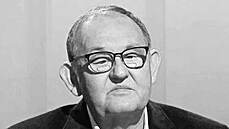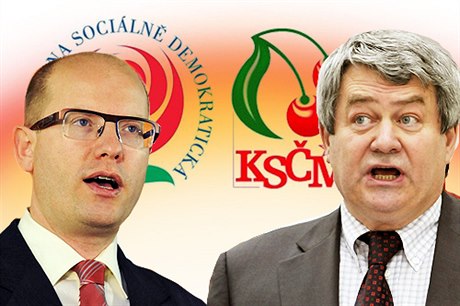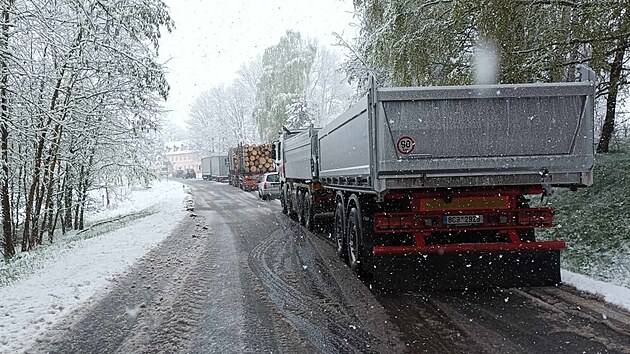At this year’s May Day celebrations in Chomutov, Communist (KSČM) party chairman Vojtěch Filip made his first speech at a meeting hosted by the Social Democrats (ČSSD). Although his counterpart, Bohuslav Sobotka, reacted coldly to the move, it’s necessary to wait until the ČSSD and the Communists clarify their relations and the “big” elections force them to show their colors to see what’s what.
Following a CVVM survey at the start of April, a second well-entrenched agency noted a significant strengthening of the Czech left, especially the Communists (KSČM). Two days after May Day, Factum Invenio published the results of the latest opinion poll. It shows that now the Social Democrats (ČSSD) would easily win an election to the lower house (27.3 percent of votes) and the KSČM would come second (17.6 percent).
Meanwhile, the center-right Civic Democrats (ODS) are at 16.4 percent and their coalition partner TOP 09 at 10.7 percent; former junior coalition partner Public Affairs (VV) — now spilt in two — would fall well short of the 5 percent threshold needed to win seats (with 1.2 percent). In contrast, the Christian Democrats (KDU-ČSL), which left parliament after the May 2010 contest, would make a comeback (7.1 percent), and, it seems, so too would the Green Party (SZ), with 5.1 percent.
Compared to the last parliamentary elections, the Communists fare better by 6.3 percentage points and ČSSD by 5.2 percentage points. In terms of seats, both left-wing parties together would have 114 MPs — a comfortable majority in the 200-seat Lower House. If the Left’s strengthening is to become a trend (as is indicated by at least three consecutive surveys from these polling agencies), we could be closer to a “red glow over the Czech Republic” than at any time since November 1989.
The conditional “if” is appropriate, as is the question whether the Czech right could effectively face up to this growing “glow.” It doesn’t look too hopeful: firstly, the Right’s electoral potential is languishing; secondly, it pulls out the bogeyman of the Left so often that it has become a harmless prop.
Ineffective mobilization campaigns
The ODS has been “mobilizing” against the left-wing threat since the 1998 elections. At the time, it was the ČSSD, with whom it subsequently went on to sign the “opposition agreement” or secret coalition. Later it mobilized in “one fell swoop” against “KSČSSD.” It was ironic that before the 2006 election KDU-ČSL also rallied against the Communist threat, though they were formerly the broad National Front before November 1989 [which included other parties along with the Communists] and was a coalition partner with ČSSD and US-DEU (the Freedom Party and Democratic Union) and from 2002 to 2006.
TOP 09 deputy chairman Miroslav Kalousek, the then chairman of the KDU-ČSL and current finance minister, usually makes a good appraisal, this time he didn’t. By drumming against the Communists, he gave notice that under his leadership the party would steer away from the Social Democrats to the Right and then prime minister Mirek Topolánek’s ODS, but the public didn’t fully appreciate it. In the Lower House elections at the start of June 2006 not only did KDU-ČSL finish without its desired double-digit result, its percentage was whittled down to 7.22 percent of the vote. If the electoral preferences of ČSSD and the Communists are at an all time high, despite scaring the public with the Left, then the anti-left “mobilization” campaigns are not very effective, if not negligible.Why?
It’s the same as a doctor prescribing the same antibiotic to his patients. It’d also stop working after a while! But does the Czech Right have something at hand in case a real threat looms? Not a left-wing Government, which is no disaster for a democracy, rather a “change to the essentials of the democratic rule of law.”
Communist demands
The radically left-wing Communists probably don’t see these “essentials” as “unassailable” in the sense of Article 9, paragraph 2, of the Czech Constitution. For the hardliners, from the “class perspective” it is undoubtedly a bourgeois Constitution. Twenty-two years after November 1989, the Communist Party still has plenty of such members and not just because the average member of the 50,000 strong KSČM is over 70 years old. The Communist “coalman's faith,” as [literary critic] F. X. Šalda put it, is “inherited,” so we even find hardliners among the middle-aged and youth.
One such, Deputy Chairman of the Central Committee of the Communist Party, Stanislav Grospič (48), duly “unwrapped” this in a May Day speech at the Prague Exhibition Grounds. Grospič, who will run against Vojtěch Filip for party head at the Congress in Liberec this month, denounced “today’s moral morass of right-wing corruption.” And as president of the Trade Union Federation of Bohemia, Moravia and Silesia he reiterated the three demands of trade unionists demonstrating on April 21 in Prague’s Wenceslas Square — the immediate cessation of reforms, the resignation of the government and early elections.
Note, too, that they added others from KSČM – higher taxes on big capital interests and banks and a muck out of the moral morass that the right-leaning coalition has dragged the political scene into with its corruption scandals. And to be clear, he added that the State is being robbed by the likes of “[Petr] Nečas, Kalousek, [Vít] Bárta, [Karolína] Peake, [Jaromír] Drábek, [Leoš] Heger and by those who pay them: [Zdeněk] Bakala, [Petr] Kellner, [Andřej] Babiš and [Aleš] Hušák.”
Ever since first communist prime minister and president Klement Gottwald, who, in his first parliamentary speech, promised to wring the necks of the bourgeoisie, a certain vocabulary and certain clichés belong to the Communists, therefore Grospič didn't forgot to recall the shooting of protesting workers and miners during the Austro-Hungarian Empire. And he added: “The First Republic was no better. Nor should we delude ourselves that, in a given moment, this government, the ruling oligarchy and the Czech Right wouldn’t also resort to such scenarios.”
It is absurd and not overly clever, so I have a similar retort. What about the gallows for co-members and “enemies of the establishment,” if the Communist Party gets back into power? Can we delude ourselves that they wouldn’t bring them back at a certain moment?
Increasing aggressiveness
A similar vision of the world to Grospič’s, for instance, is held by KSČM's President of the Prague Regional Council, an MP and candidate for Deputy Chair or even Chair of the Communists, Marta Semelová (52), who regularly lays flowers on Gottwald’s grave, glorifies the heroic border guards on this side of the former Iron Curtain, but laconically says that those that were shot had violated the valid laws. Prime Minister Nečas (ODS) responded to Grospič's May Day deductions by saying, “The Communists have not fully relinquished the totalitarian past and recently their aggression has been on the increase.” He’s right, but despite this, KSČM is the second most attractive political party!
This is a problem, not just for the Government coalition, whose Interior Minister had experts examine whether there was a relevant reason for a court ban on KSČM’s activities. They didn’t find one, thus, from the legal aspect, KSČM must be viewed like any other political party operating in accordance with the law. Thinking it through ad finitum, they must be seen as a democratic party, though without doubt one that is against the current regime, and has extreme views on a number of issues, both of which facts are quite obvious when reading their party newspaper Haló six times a week.
ČSSD is in an unenviable position. On the one hand, it is highly likely it will win the next elections to the Lower House, on the other hand it will also be landed with the KSČM; without their support, or even power sharing, ČSSD will not be able to govern. If party chairman Bohuslav Sobotka insists he will not form a coalition with ODS or TOP 09, then there are three options, of which only two are realistic.
Two realistic options
Unlike Robert Fico’s SMER SD in Slovakia, the ČSSD have no chance of winning the election with an absolute majority of seats, thus circumventing the need for a coalition partner. If they win the election, receiving around 35 percent of the vote, while the KDU-ČSL and the Green Party return to parliament, they could create a center-left coalition. Asked by the left-leaning daily Právo on May 2 whether the KDU-ČSL would form a government with ČSSD, their head, Pavel Bělobrádek, replied: “Definitely. The ČSSD are a democratic and pro-European party.” But as concerns support for the Communists, “under my leadership there will be no such thing,” assures Bělobrádek.
By the way, long-time KDU-ČSL leader Josef Lux faced a similar problem in spring 1998 when then prime minister (and current ČSSD presidential hopeful) Miloš Zeman offered him a two-member coalition with the ČSSD. Though probably just superficially, reportedly from the spring of that year he was reconnoitering the lay of the land with the then Civic Democrat leader Václav Klaus. A ČSSD and KDU-ČSL government, however, would have had to have been tolerated by the Communists in a confidence vote, and Lux knew it would not wash with his party.
The second real alternative is that “red glow over the Czech Republic.” It would rest on an agreement between ČSSD and KSČM - either on open coalition, thus inviting the Communists into government, or on creating a minority ČSSD government, supported by the Communist Party during the confidence vote and then on a case-by-case basis.
According to Lukáš Jelínek, a political scientist from Masaryk Academy, it would be as bad for ČSSD to form a coalition with a right-wing party (which is its third option), because in both cases it would lose about a third of its supporters. The party's HQ Lidový dům (the People's House) carried out surveys on this; and according to Mláda fronta Dnes they were similarly skeptical.
Experience from the regions
The least risky seems to be a minority ČSSD government with the support of Communist votes, which Sobotka has repeatedly called for. So far, only ČSSD vice chairman Jiří Dienstbier and the Central Bohemia regional governor David Rath can countenance even closer cooperation with the Communists. In fact, after the regional elections in autumn 2008, thanks to the Communists, ČSSD controls the Central Bohemia, Vysočina and Karlovy Vary regions, whilst in the Moravia-Silesia region the Communists are direct members of the regional coalition. Part of ČSSD interprets this experience as that it shows you can agree with the Communists and govern with them.
The experience from these four regions is also the reason why the Bohumín Resolution of 1995 has become stale. In this the ČSSD Congress confirmed “the validity of the conclusions concerning the inadmissibility of cooperation of social democracy with extremist political parties” and notably ruled out political cooperation with the Czechoslovak Communists Party, far-right politician Miroslav Sládek’s
It is not surprising, as after the former nomenklatura Communist Miroslav Šlouf entered ČSSD in the mid-1990s, many other former members of KSČ did likewise. This upset the status quo as until then the majority distrusted the Communists, for historical reasons, and this was typical for the ČSSD's first post-November President Jiří Horák and his close associates. Times have changed and reports that Lidový dům and KSČM Central HQ maintain contacts and discreetly negotiate are probably not mere rumors.
Historical reminiscence
But both parties are walking on thin ice. The Communist Party was founded from 1919 to 1921, when Bohumír Šmeral led the greater part of social democrats to the Marxist left, from which the KSČ arose. For the Communists, just as for the Nazis, Masaryk’s First Republic was a “Versailles reject” and they wanted to crush it with a proletarian revolution. The Social Democrats, however, supported the First Republic. For the Communists they were “sullied opportunists.” For the Social Democrats, the Communists were traitors, radicals and “Moscow's plow-boys.”
The alleged voluntary merging of ČSSD with the KSČ on June 27, 1948 was about as “voluntary” as everything else after [the Communist takeover of] February 1948 – without Fierlinger’s wing of the ČSSD, connected to the Communists, it would have been impossible. Many Social Democrats ended up in exile, even more in Communist prisons. The KSČ’s attempt to restore the ČSSD in the country during Dubček's “Prague Spring 1968” was postponed for the future, in fact until the turn of 1989-1990.
Up until 1989 the Social Democrats’ Lidový dům housed the Museum of V. I. Lenin and the ČSSD, although the oldest Czech political party (founded in 1878) started from zero when it renewed its activities in post November Czechoslovakia. There were only a few authentic Social Democrats from the previous era, no solid ideology was formed under Miloš Zeman and after the mass arrival of former Communists to its ranks it became so pliant that its desire to return, finally, to power means it treats the Communists with kid gloves. By the way, even after 22 years of building the ČSSD, there are still more than twice as many Communists.
Coalition potential
Currently there are no other left-wing parties other than ČSSD and KSČM. If they do not become closer, the Social Democrats’ coalition potential will remain limited and their election victory will be useless, as it was in 2010 under former leader Jiří Paroubek. Without the Social Democrats, KSČM’s coalition potential is virtually zero! A truly left-wing government, if there is public demand for such a thing, can only be formed by ČSSD and KSČM. One or the other must, however, slowly and gently ease its members into this idea.
That is the reason for all the fuss over Filip’s improvised speech at ČSSD’s May Day celebrations in Chomutov, following his party meeting in the same city. The left-wing Právo’s headlines called it a “premiere.” Sobotka, the ČSSD head, celebrating May Day in far away Vyškov, reacted decidedly chilly to the news: “There is no doubt that among Social Democrats there is the belief that it is not our job to highlight the Communist Party’s head at our meetings.” The deputy chairwoman of ČSSD, Maria Beneš, as well as the Ústí district commissioner, Jana Vaňhová, was in Chomutov on May 1, however, “overall it (hosting Filip) wasn’t disagreeable.”
Before ČSSD and KSČM clarify their relationship and the “big” election forces them to show their colors, we can at least state: whether KSČM becomes a governing party or whether it supports a minority ČSSD government from the opposition, it would not be without sacrifices on both sides and certainly not for free. How would ČSSD stand for the Czech Republic leaving NATO and the European Union, which is an objective of the Communists?
If the answer to that is positive, they would betray themselves, becoming the black sheep of the Socialist International. Moreover, we would commit suicide, just as in July 1947, when Czechoslovakia, under pressure from Moscow, rejected participation in the Marshall Plan, thus cutting it off from Western Europe. Likewise, the Communists know full-well that if we are integrated into Euro-Atlantic democratic society by means of NATO and the EU, there cannot and will not be any further attempt to establish socialism here.
Convergence
In contrast, what can be foreseen are KSČM’s demands of a more personal nature. In the case of a coalition government with ČSSD, the various ministries; in the case of a minority ČSSD government held up by Communist votes, positions in the supervisory and administrative boards of enterprises in which the state has a share and in control and other institutions, where valuable information can be gleaned and evaluated accordingly.
So far, we have left aside the “system” demands. Stanislav Grospič mentioned these in MF Dnes on May 3 “We’d definitely repeal the Labor Code and the new health laws such as standard, above-standard and all charges. We’d also like to put through tax progression, cancel the taxation on “super-gross” salary and a ceiling on health and social insurance and the pension reforms.” The Social Democrats would probably not defend an agreement in this matter so doggedly. Both its leaders and the unions have been pleading for almost the same!
MP Jiří Rusnok, elected under Public Affairs but now with Karolína Peake’s platform, is worried about the ČSSD and KSČM convergence, “It’s a creeping and inconspicuous convergence of the two largest opposition forces, which is all the more dangerous for that. Just like the events 64 years ago, which culminated in the February 1948 coup.” A pity he didn't see this sooner and that the “VVs” didn’t have more of his ilk. The government coalition could be less disunited, citizens would not be so fed up with them than they currently are and there would be far less disillusioned people to inflate the electoral preferences for both left-wing parties.
An optimistic statement
It didn’t happen! We are where we are! Despite this, let’s finish with an optimistic statement. As concerns “Victorious February”, it was the product of a bipolar world divided by the iron curtain and the fact that it was our fault that we found ourselves on its eastern side, in Stalin’s pashalik. Today our Communists have their “international allies” in Cuba, Venezuela, and North Korea, though they are unable to effectively help them prepare for a new “Victorious February” and maintain the “revolutionary paraphernalia”, even if they wanted to try something of the kind or even if it occurred to them. Why?
Even KSČM has its elite, which speaks fiercely, but rationally gives preference to some 20 or 30 secure seats rather than the vision of revolution somewhere on the horizon. After all, even our comrades are also mere people, albeit with a “special stamp”!
— Petr Nováček is a commentator for Czech Radio 1-Radiožurnál.





